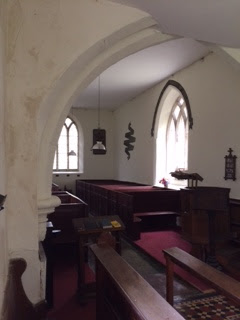Well, it's a slim volume, so it won't take any shelf space, and it's a knockdown price, and fate has clearly thrown it in my way... So I reasoned with myself as I put up a token resistance to the inevitable purchase of John Betjeman's Church Poems, illustrated by John Piper (John Murray, 1981, condition v.g. with dust-wrapper, £2.99), spotted on the shelves of one of my regular charity shops this morning. It's a lovely volume (though the jacket colour is a slightly bilious mustard yellow), and Piper's elegant, lightly drawn sketches perfectly complement Betjeman's poems.
The first entry is a Lincolnshire poem – in fact, the first that Betjeman wrote about a part of the country he knew well and loved above all other maritime counties except, of course, Cornwall. 'A Lincolnshire Tale', a mock-Gothic ballad in a springy anapaestic meter, was inspired by the out-of-the-way churches of the Lincolnshire Wolds, a part of the country he knew particularly well from visits to his friend Noel Blakiston at Kirkby-on-Bain, near Horncastle. 'Kirkby' is the only authentic place name in the poem, the others being highly plausible inventions. I find it all very evocative, having been in the Lincolnshire Wolds only recently; in particular it puts me in mind of following an uncertain path across exposed open land, beside rivers and drains, to reach the little churches of St Adelwold, Alvingham, and St Mary, North Cockerington, which stand within yards of each other in the same remote churchyard. Below is my picture of one of them, I think North Cockerington. And here is 'A Lincolnshire Tale' –
Kirkby with Muckby-cum-Sparrowby-cum-Spinx
Is down a long lane in the county of Lincs.
And often on Wednesdays, well-harnessed and spruce,
I would drive into Wiss over Winderby Sluice.
A whacking great sunset bathed level and drain
From Kirkby with Muckby to Beckby-on-Bain,
And I saw, as I journeyed, my marketing done,
Old Caisterby tower take the last of the sun.
The night air grew nippy. An autumn mist roll’d
(In a scent of dead cabbages) down from the wold,
In the ocean of silence that flooded me round
The crunch of the wheels was a comforting sound.
The lane lengthened narrowly into the night
With the Bain on its left bank, the drain on its right,
And feebly the carriage-lamps glimmered ahead
When all of a sudden the pony fell dead.
The remoteness was awful, the stillness intense,
Of invisible fenland, around and immense;
And out on the dark, with a roar and a swell,
Swung, hollowly thundering, Speckleby bell.
Though myself the Archdeacon for many a year,
I had not summoned courage for visiting here;
Our incumbents were mostly eccentric or sad
But – the Speckleby Rector was said to be mad.
Oh cold was the ev’ning and tall was the tower
And strangely compelling the tenor bell’s power!
As loud on the reed-beds and strong through the dark
It toll’ from the church in the tenantless park.
The mansion was ruined, the empty demesne
Was slowly reverting to marshland again –
Marsh where the village was, grass in the Hall,
And the church and the rectory waiting to fall.
And even in springtime with kingcups about
And stumps of old oak-trees attempting to sprout,
‘Twas a sinister place, neither fenland nor wold,
And doubly forbidding in darkness and cold.
As down swung the tenor, a beacon of sound,
Over listening acres of waterlogged ground
I stood by the tombs to see pass and repass
The gleam of a taper, through clear leaded glass.
And such lighting of lights in the thunderous roar
The heart summoning courage to hand at the door;
I grated it open on scents I knew well,
The dry smell of damp rot, the hassocky smell.
What a forest of woodwork in ochres and grains
Unevenly doubled in diamonded panes,
And over the plaster, so textured with time,
Sweet discolouration of umber and lime!
The candles ensconced on each high panelled pew
Brought the caverns of brass-studded baize into view,
But the roof and its rafters were lost to the sight
As they soared to the dark of the Lincolnshire night:
And high from the chancel arch paused to look down
A sign-painter’s beasts in their fight for the Crown,
While massive, impressive, and still as the grave
A three-decker pulpit frowned over the nave.
Shall I ever forget what a stillness was there
When the bell ceased its tolling and thinned on the air?
Then an opening door showed a long pair of hands
And the Rector himself in his gown and his bands.
. . . . . . . . . .
Such a fell Visitation I shall not forget,
Such a rush through the dark, that I rush through it yet,
And I pray, as the bells ring o’er fenland and hill,
That the Speckleby acres be tenantless still.



No comments:
Post a Comment